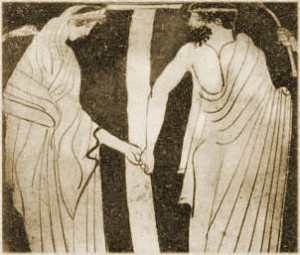 Two votes at the Council of Nicaea (325 A.D.) underscored the Church Fathers’ devotion to marriage. The first vote maintained clerical marriage relationships, the second defended surviving spouses’ remarriage. Though the latter was a clear indication of their esteem for the institution, in that they provided for widows and widowers who yearned for a new mate, it was actually a moderating vote. So high was the Church’s regard for a couple’s original vows that such prominent figures as Hermas, Justin Martyr, and Athenagoras argued that the bond outlasted death itself. In the end, their stricture was not adopted, but the very fact of its consideration showed the group was quite serious about marital vows. As one patristic scholar, Willy Rordorf, put it, “Concerning the conception of marriage as a total union of the couple implying a fidelity without reserve, there is unanimous agreement between the New Testament and the Early Church.”
Two votes at the Council of Nicaea (325 A.D.) underscored the Church Fathers’ devotion to marriage. The first vote maintained clerical marriage relationships, the second defended surviving spouses’ remarriage. Though the latter was a clear indication of their esteem for the institution, in that they provided for widows and widowers who yearned for a new mate, it was actually a moderating vote. So high was the Church’s regard for a couple’s original vows that such prominent figures as Hermas, Justin Martyr, and Athenagoras argued that the bond outlasted death itself. In the end, their stricture was not adopted, but the very fact of its consideration showed the group was quite serious about marital vows. As one patristic scholar, Willy Rordorf, put it, “Concerning the conception of marriage as a total union of the couple implying a fidelity without reserve, there is unanimous agreement between the New Testament and the Early Church.”
It may seem strange that the Council of Nicaea, known for affirming the divinity of Christ, also dealt with such matters. But, this is not so surprising given the context. According to Roman law (which applied throughout the empire) marriage was a private contract like any other contract—dissolvable by one or both parties. Consequently, divorce was not difficult to obtain. So church leaders took a counter-cultural stance, at odds even with practice within their congregations. When Chrysostom preached on divorce, he noted that some members of his congregation “hung their heads in shame,” and Ambrose found it necessary to instruct his readers not to make use of the government’s divorce laws. In fact (and likely with the empire’s toleration in mind), the Fathers were steadfast in their defense of marriage, which they saw both as a sacrament (symbolic of Christ’s relationship with the Church) and as a means of witnessing to God’s steadfast love for humanity.
The Fathers did disagree on the implications of adultery for remarriage and wrestled over interpretation of Matthew 19:9—“whoever divorces his wife, except for sexual immorality, and marries another, commits adultery” (ESV). Some, such as Augustine, prohibited remarriage under any circumstances, and others, such as Chrysostom, allowed for it when a spouse was the victim of adultery. The Shepherd of Hermas took the stricter stance: If a husband finds that his wife has committed adultery and she is unrepentant—he must “dismiss her” and not remarry. But Tertullian claimed exceptions: “Permanent is the marriage which is not rightly dissolved; to marry, therefore, whilst matrimony is undissolved, is to commit adultery. . . . Divorce, therefore, when justly deserved, has even in Christ a defender.” In granting the marriage bond could be “rightly dissolved,” Tertullian suggested “the correlative right to remarry.”
Of course, this disagreement mirrors contemporary debates within the Church. Not surprisingly, those who reject remarriage—without exception—will point to the early Church’s strong defense of marriage. But defenders of a biblical permission to remarry—under certain circumstances—caution us that the Fathers did not speak with one voice on this issue.
How then are the Fathers to be understood? At the very least, they were staunch advocates of marriage in a civil society and culture in which the covenant of marriage could sometimes be seen as a little more than another legal contract—not unlike today. The early Church grappled with the biblical text, applying it to every aspect of their lives—from their doctrine of Christ to their doctrine of marriage. Since we live in a culture willing to throw out marriage, embrace divorce, and assume remarriage—in all circumstances—the Fathers may be worth another look.
2 thoughts on “The Church Fathers’ High View of Marriage”
Comments are closed.
Indeed, these are very good points. The Church Fathers were fairly strict on the issue of divorce. Unfortunately, this view is viewed by many today as “fundamentalist.” John Piper also has a very good discussion of this and so does Wenham & Heath (Jesus and Divorce)…
In my opinion – the non-biblical preaching and teaching found today in very many evangelical churches is seriously hurting the church…because many marriages (and divorces) look rather similar to those of the rest of the world! 🙁
A ‘Christian’ woman I once knew committed adultery. She left her family and destroyed her close friend’s family so that she could be with the person she committed adultery with. Her Pastor was informed and he pointed out that God would have warned her. It turned out that God had warned the woman, whose trust, she had betrayed. eBooks about this particular awful deed have been written. They are called ‘The Vision’ and ‘The Pious Whore’. A must read because even in these times of tribulation God is there with us no matter how painful the journey is.